Document on Irish Liberation Submitted to World Congress of Peace Forces, Moscow 1973
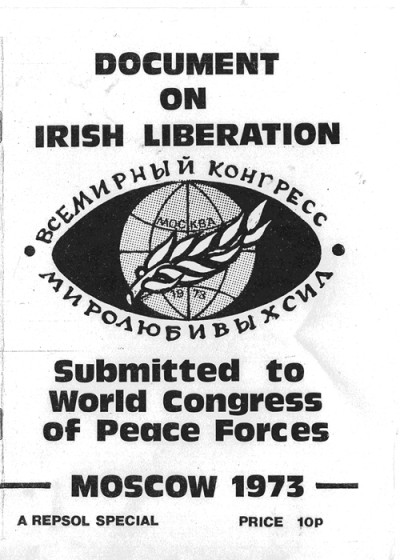
| Date: | 1973 |
|---|---|
| Organisation: | Sinn Féin [Official] |
| Series: | Repsol Pamphlets, Special |
| Type: | Pamphlet |
| View: | View Document |
| Discuss: | Comments on this document |
| Subjects: |
Please note: The Irish Left Archive is provided as a non-commercial historical resource, open to all, and has reproduced this document as an accessible digital reference. Copyright remains with its original authors. If used on other sites, we would appreciate a link back and reference to The Irish Left Archive, in addition to the original creators. For re-publication, commercial, or other uses, please contact the original owners. If documents provided to The Irish Left Archive have been created for or added to other online archives, please inform us so sources can be credited.
Commentary From The Cedar Lounge Revolution
12th May 2008
So, here from 1973 is a document published by REPSOL for Official Sinn Féin as a submission to the “World Cogress of Peace Forces” in Moscow. Much of it as would be expected. Consider the references to “Ireland [joining] the so-called European Economic Community thus adding to the domination and exploitation of our people by this new modern imperialist bloc.”
The language as regards armed struggle is ambiguous. Note that it argues that “…we have realised that armed struggle on its own, or as an end in itself, is doomed to failure. Armed struggle must always be related to the needs of the people.”
Yet it continues… “The most consistent element in the Irish Republican tradition is armed resistance to British imperialism. It was only out of this armed resistance that our revolutionary vision of the Ireland of tomorrow came”
And as a nod towards Moscow’s sensitivities it argues that “It is essential that all who are involved in the National Struggle for Liberation realise that the national struggle is a people’s struggle - a class struggle”. The language as regards Britain is much stronger than might be expected, to the point that we read “There is only one issue on which practically everyone in Ireland is agreed. We do not want to be ruled by Britain. This fact must therefore be made clear and emphatic. All should unite on the demand “Britain get out”.
Indeed Tomas Mac Giolla (sans fada’s) is quoted as urging delegates to the Congress to ‘support the short and long term Republican demands which called for the withdrawal of British Troops and an end to all repression in Ireland’.
Which is interesting, but no more so than the following: “Clearly as with the British imposed arrangement of 1920, any solution which advocates the continuation of a Six or Nine County Ulster state, whether it has constitutional links with Britain, or not, must be rejected.”. A dig at PSF who had recently issued Éire Nua? More than likely. But interesting how in order to fend off the Provisionals it was necessary to ramp up the anti-British rhetoric.
It’s a brief document but a telling insight into the direction of a much harder edged ‘Republican’ stance evident in Official Sinn Féin at this point in time.
More from Sinn Féin [Official]
Sinn Féin [Official] in the archive
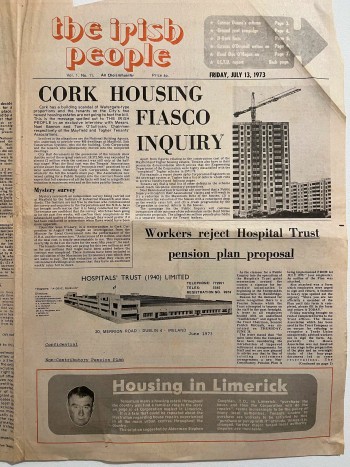
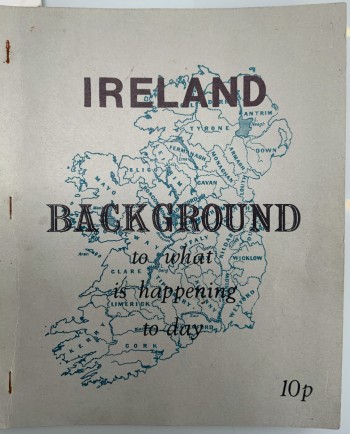
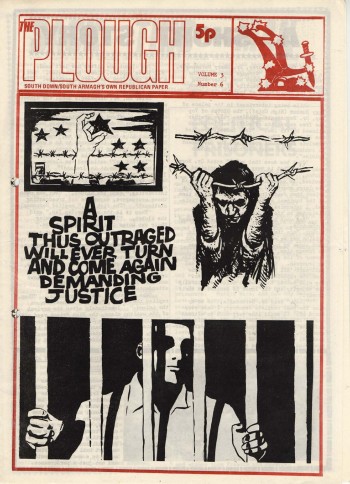
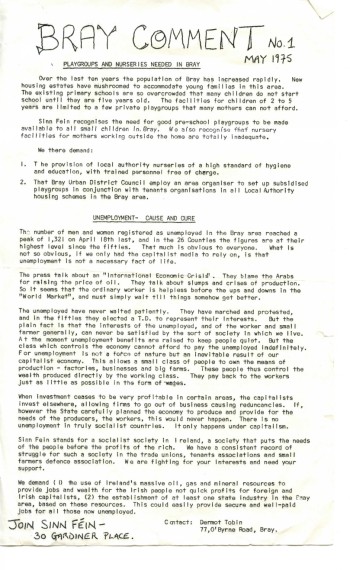
Comments
No Comments yet.
Add a Comment
Comments can be formatted in Markdown format . Use the toolbar to apply the correct syntax to your comment. The basic formats are:
**Bold text**
Bold text
_Italic text_
Italic text
[A link](http://www.example.com)
A link
You can join this discussion on The Cedar Lounge Revolution
By: bill Wed, 14 May 2008 23:49:48
Actually on a and b you maybe right Garibaldy
Reply on the CLR
By: Redking Thu, 15 May 2008 12:31:20
“Still the idea of a tactical short campaign is an interesting one. Any other sources to corroborate that?”
I’ve spoken to people who were involved in geting the IRSP/INLA off the ground in Derry in 1975/6 and what seems clear is that there was an element of the hare-brained about the notion of an intensive campaign. Firstly, the amount of equipment varied greatly from region to region-ironically in Derry where the IRPS were strong due to large defections from both the Provos and the Officials, they had virtually no guns.
Maybe Costello’s idea was to try to take the whole of the Army with him or swing the whole movement behind himself- after 1973 a non-runner.
After1976 there was all sorts of stuff discussed at Brigade staff level-such as a plan to (I kid you not)”liberate” the whole of the west bank of the Foyle-which many of the IRPS even thought was nuts.
Reply on the CLR
By: Pete Thu, 15 May 2008 13:56:15
The Liberation of the ‘west bank’ of the Foyle dates from 1972, always one of Costello’s pet projects
Reply on the CLR
By: WorldbyStorm Thu, 15 May 2008 17:22:01
Amazing idea… although…
Reply on the CLR
By: Jim Monaghan Fri, 16 May 2008 09:59:49
On Redkings message.
When groups split there is usually a dispute about the assets. Most leftwing groups argue about a secong printing press. Gerry Healy won over his opponents because he controlled the company who owned the press. Morning Star persists because of its assets.
The IRSP was attacked by the Officials. The first killed was an IRP from the Whiterock. The Irps beat a retreat to the Diovis flats (then called the Planet of the Irps).
I beleive this put Costello in thrawl to the militarists.The rest is a fairly painful history.
There a paralleles with ETA where all the left splits withered on the ground compared to the militarists.
I suppose being a Trotskyist of sorts I am immune to the worship of the USSR which still persists, the WP were even more enamoured than the CPI.
McGurran was supposed to be the most friendly to Trotskyists.
Costello was a pragmatist. He might have made something out of the H-Block movement.
I was tols his Belfast people ran him ragged with demands for resources he could never deliver.
Reply on the CLR
By: Redking Fri, 16 May 2008 13:14:18
Yes-I know that dynamic exists Jim, but not sure that the disputes of ultra-left microsects like the WRP can really be compared with the dramatic events of 1974-5 in OSF which was a largish party in circumstances of communal conflict in the North. To say that the stakes were much higher is to probably underestimate things.
What happened to young Ferguson was awful and things got worse after that-I mean McMillen and others killed and maimed. I guess its easy even after 30 years to descend into a “whataboutery” about those events-BTW I’m not suggesting you’re doing that….
Costello was a complex and interesting character and wrong on many levels-but nonetheless an important historical figure-maybe a seperate post on him wouldn’t go amiss WBS??
Reply on the CLR
By: WorldbyStorm Fri, 16 May 2008 17:49:46
I’ll do my best. There are others better qualified though than I to write about him.
Reply on the CLR